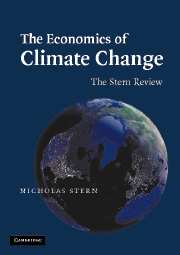Book contents
- Frontmatter
- Contents
- Preface
- Acknowledgements
- Introduction
- Summary of Conclusions
- Part I Climate Change – Our Approach
- Part II Impacts of Climate Change on Growth and Development
- Part III The Economics of Stabilisation
- Part IV Policy Responses for Mitigation
- Part V Policy Responses for Adaptation
- Part VI International Collective Action
- Abbreviations and Acronyms
- Postscript
- Technical Annex to Postscript
- Index
Technical Annex to Postscript
Published online by Cambridge University Press: 05 March 2014
- Frontmatter
- Contents
- Preface
- Acknowledgements
- Introduction
- Summary of Conclusions
- Part I Climate Change – Our Approach
- Part II Impacts of Climate Change on Growth and Development
- Part III The Economics of Stabilisation
- Part IV Policy Responses for Mitigation
- Part V Policy Responses for Adaptation
- Part VI International Collective Action
- Abbreviations and Acronyms
- Postscript
- Technical Annex to Postscript
- Index
Summary
Some commentators on the Review have focussed on particular technical issues associated with modelling the aggregated impacts of climate change. Our estimates of damage from climate change derived from formal economic modelling are higher than many estimates in the literature, and there has rightly been strong interest in our underlying assumptions. This paper responds to some of the comments on the modelling we have received in the weeks since the publication of the report.
The questions concern both the model structure and the ethical judgements that are embodied in the evaluations. Investigating these questions allows us to use the models to clarify the roles of the different assumptions in a structured way. We did not present these results as part of Chapter 6, but we have subsequently carried out a sensitivity analysis in this area and the results are presented below. This Technical Annex can be seen, in part, as an annex to Chapter 6.
The Role of Integrated Assessment Models (IAMs)
Integrated assessment models attempt to summarise the impacts of climate change, usually in terms of aggregate gains or damages in terms of income. These models, on the basis of their assumptions, give an idea of the magnitude of risks, their evolution over time and sensitivity to emissions. As the Review makes clear, the role of IAMs is to give an illustration of the potential effects of climate change.
- Type
- Chapter
- Information
- The Economics of Climate ChangeThe Stern Review, pp. 658 - 672Publisher: Cambridge University PressPrint publication year: 2007



